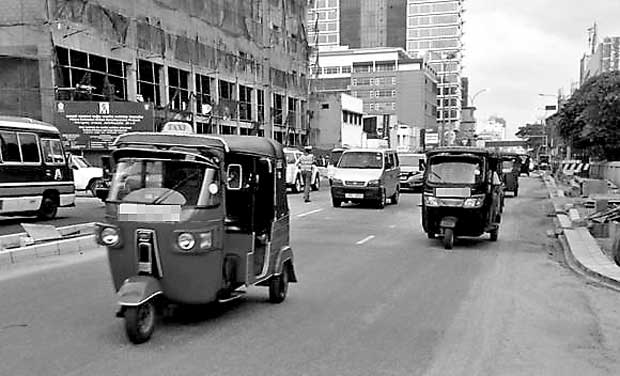Public policy failures, social unrest and economic decline


 here are more than enough signs of social unrest in the country today. In fact, the prevailing state of affairs in could be described as unsettling, to say the least. Inhuman ragging in the universities is nothing new but has become more endemic within the system. Our streets have become unmanageable, even by an ever-increasing number of traffic police officers. They built environment in and around urban centres is a big mess and threaten public health as well as civilized urban life. A majority of young people are almost completely lost in schools, universities and everywhere else. The country’s human resources are almost totally mismanaged. While we employ over 260,000 teachers in about 10,000 public schools in the country, private tuition masters visit middle class houses in hybrid vehicles to coach well-to-do children in order for them to have an edge over the underprivileged. Nearly a million three-wheeler drivers cannot help but drive their vehicles all over the place to earn their rupees before their potential customers disappear from the city streets in the evening.
here are more than enough signs of social unrest in the country today. In fact, the prevailing state of affairs in could be described as unsettling, to say the least. Inhuman ragging in the universities is nothing new but has become more endemic within the system. Our streets have become unmanageable, even by an ever-increasing number of traffic police officers. They built environment in and around urban centres is a big mess and threaten public health as well as civilized urban life. A majority of young people are almost completely lost in schools, universities and everywhere else. The country’s human resources are almost totally mismanaged. While we employ over 260,000 teachers in about 10,000 public schools in the country, private tuition masters visit middle class houses in hybrid vehicles to coach well-to-do children in order for them to have an edge over the underprivileged. Nearly a million three-wheeler drivers cannot help but drive their vehicles all over the place to earn their rupees before their potential customers disappear from the city streets in the evening.
What is important to note here is that the stamping out of the ragging was achieved not by simply imposing punitive measures but by adopting a holistic approach to student affairs that helped transform the university landscape in to a vibrant intellectual environment where academics and students work together to make campus life productive and satisfying for all segments of the university community.
The issues connected with ragging are equally significant and important but space does not permit any discussion here. But the point is already made. We have a top heavy government, but the political leaders and the bureaucrats often do not make things happen but let things happen leading to the proliferation of public protests in almost all sectors.

Colossal mismanagement of public finances in the recent past has not only contributed to the current public debt burden, putting the country at risk but also led to the current negative public attitude towards taxation. The continuing wasteful public spending, the instances of which are reported almost daily in the media can only make the situation worse. Only careful efforts to maintain a high level of fiscal discipline can reverse this trend. The country can ill-afford to postpone critical investments in strategically important areas like Research and Development, education, health and public transport. Governments ability to do this depends on a higher level of tax revenue.
Another area that is almost totally neglected is human resource management. We have no clear national policy or plan to make optimal use of the country’s labour force which stands at just over 8 million persons. Nearly a million of them drive three wheelers partly due to lack of better alternative employment and partly due to the transport mess in the country. Many male youth have no faith in the education system and leave school early leading to an increasing feminization of the student population.

2017-03-27

 here are more than enough signs of social unrest in the country today. In fact, the prevailing state of affairs in could be described as unsettling, to say the least. Inhuman ragging in the universities is nothing new but has become more endemic within the system. Our streets have become unmanageable, even by an ever-increasing number of traffic police officers. They built environment in and around urban centres is a big mess and threaten public health as well as civilized urban life. A majority of young people are almost completely lost in schools, universities and everywhere else. The country’s human resources are almost totally mismanaged. While we employ over 260,000 teachers in about 10,000 public schools in the country, private tuition masters visit middle class houses in hybrid vehicles to coach well-to-do children in order for them to have an edge over the underprivileged. Nearly a million three-wheeler drivers cannot help but drive their vehicles all over the place to earn their rupees before their potential customers disappear from the city streets in the evening.
here are more than enough signs of social unrest in the country today. In fact, the prevailing state of affairs in could be described as unsettling, to say the least. Inhuman ragging in the universities is nothing new but has become more endemic within the system. Our streets have become unmanageable, even by an ever-increasing number of traffic police officers. They built environment in and around urban centres is a big mess and threaten public health as well as civilized urban life. A majority of young people are almost completely lost in schools, universities and everywhere else. The country’s human resources are almost totally mismanaged. While we employ over 260,000 teachers in about 10,000 public schools in the country, private tuition masters visit middle class houses in hybrid vehicles to coach well-to-do children in order for them to have an edge over the underprivileged. Nearly a million three-wheeler drivers cannot help but drive their vehicles all over the place to earn their rupees before their potential customers disappear from the city streets in the evening.
Meanwhile, the country is yet to recover from the 1956 shock and its consequences. The list goes on and on. So, let me sum up in one sentence. The colossal public policy failures have contributed immensely to the present political, economic, social and cultural chaos and our political leaders do not appear to know how to reboot the policy making machinery to set in motion a process of recovery. The fact that political vultures are hovering above the heads of gullible masses is no doubt  a major worry for them but, every single day lost by postponing a serious overall policy analysis and mapping out strategies to sort out the mess can only make the recovery harder.
a major worry for them but, every single day lost by postponing a serious overall policy analysis and mapping out strategies to sort out the mess can only make the recovery harder.
It is true that public policies, no matter how sound they might be, take time to bring about the desired change, either in the national economy or in important sectors like health, education and transport. But, we have no choice in the matter. More we wait to formulate and implement evidence based policies, our problems can only get worse, creating more unrest in the country. This is true at an institutional level as well as at a national level.
 a major worry for them but, every single day lost by postponing a serious overall policy analysis and mapping out strategies to sort out the mess can only make the recovery harder.
a major worry for them but, every single day lost by postponing a serious overall policy analysis and mapping out strategies to sort out the mess can only make the recovery harder. It is true that public policies, no matter how sound they might be, take time to bring about the desired change, either in the national economy or in important sectors like health, education and transport. But, we have no choice in the matter. More we wait to formulate and implement evidence based policies, our problems can only get worse, creating more unrest in the country. This is true at an institutional level as well as at a national level.
Given the vastness of the subject at hand, let me just give a few illustrative examples. First, ragging in the universities, is a symptom of a deeper malaise within the education system. We had a similar situation in the universities in the late 1980’s, following the second JVP uprising and the student agitations against the establishment of the North Colombo Medical School. Inhuman ragging was part of a complex situation that prevailed in the universities. In the Colombo university, we formulated and launched a comprehensive programme of interventions that involved various cultural activities, community work for students, teaching of languages involving university alumni, counselling, disciplinary action against ‘raggers’, internships for undergraduates in private firms, etc. In spite of initial resistance by a minority of students, sadistic ragging was stamped out from the university. Some of the then students who contributed to the above program are at present people’s representatives in parliament and they know that what is mentioned above is true. Yet ragging is not just an internal affair, but a part of youth unrest in society at large and deserves more than an institutional response.
What is important to note here is that the stamping out of the ragging was achieved not by simply imposing punitive measures but by adopting a holistic approach to student affairs that helped transform the university landscape in to a vibrant intellectual environment where academics and students work together to make campus life productive and satisfying for all segments of the university community.
The issues connected with ragging are equally significant and important but space does not permit any discussion here. But the point is already made. We have a top heavy government, but the political leaders and the bureaucrats often do not make things happen but let things happen leading to the proliferation of public protests in almost all sectors.

Space does not permit me to look at various issues and the policy environment in the country in detail. So, let me take one or two examples. It is crystal clear from the available official data that income inequality has got worse over the last several decades while the GDP of the country has expanded steadily. The poorest 10% of the people earn about 2% of the national income while the richest 10% control nearly 40%. This situation has serious adverse economic consequences and these consequences and these consequences should be addressed through appropriate policy responses. It is proven beyond doubt that progressive taxation is the key policy option available to us to rectify this situation. For lower taxes, in particular lower personal income taxes, do not necessarily result in more productive investment but lead to ever increasing, wasteful and unproductive private consumption. What is even more important is the resulting contraction of public finances, preventing the government from making critical public investments in areas that matter for economic and social development in the country.
"Another area that is almost totally neglected is human resource management. We have no clear national policy or plan to make optimal use of the country’s labour force which stands at just over 8 million persons"
On the other hand, the tax revenue of a government depends not only on the rate of taxation but also on the effective governance of the taxation system. The confidence and trust that taxpayers have in the posses of governance of tax revenue go a long way in ensuring the efficiency and fairness of the tax system in a country. Where there is no accountability on the part of decision makers with respect to the management of public finances, potential tax payers and officials become indifferent, or even cynical towards payment and collection of taxes. Tax evasion is often the result, producing low tax revenue.
Colossal mismanagement of public finances in the recent past has not only contributed to the current public debt burden, putting the country at risk but also led to the current negative public attitude towards taxation. The continuing wasteful public spending, the instances of which are reported almost daily in the media can only make the situation worse. Only careful efforts to maintain a high level of fiscal discipline can reverse this trend. The country can ill-afford to postpone critical investments in strategically important areas like Research and Development, education, health and public transport. Governments ability to do this depends on a higher level of tax revenue.
Another area that is almost totally neglected is human resource management. We have no clear national policy or plan to make optimal use of the country’s labour force which stands at just over 8 million persons. Nearly a million of them drive three wheelers partly due to lack of better alternative employment and partly due to the transport mess in the country. Many male youth have no faith in the education system and leave school early leading to an increasing feminization of the student population.
In other words, some of the problems we face could also be addressed at an institutional level. But most of the problems we face in the country today cannot be resolved unless we come up with decisive policy responses. Since the life chances of a majority of citizens depend on such policy responses, any delay in adopting such measures could ruin the lives of thousands of people - both young and old.
